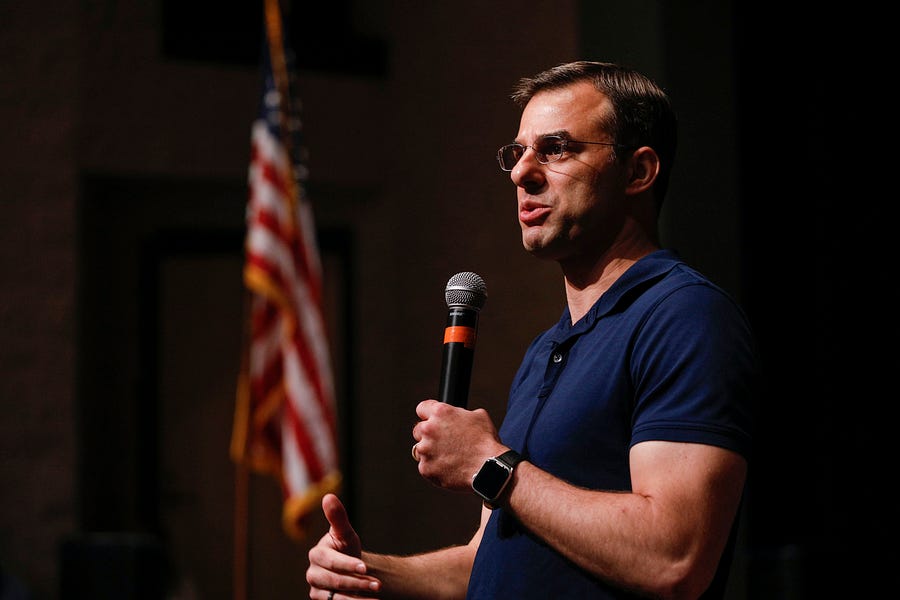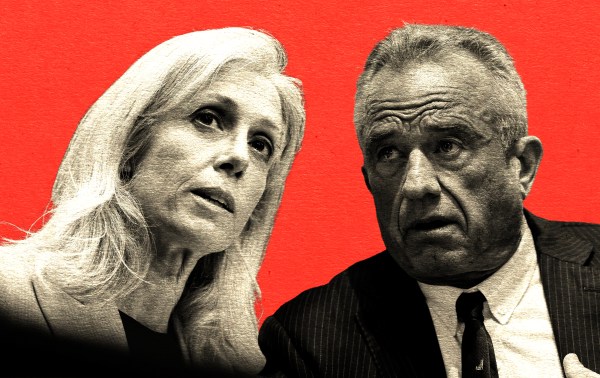Justin Amash is (probably) running for president. He’s toyed with the idea for over a year: Describing himself as an ideal third-party candidate at libertarian conferences, posting cryptic tweets about Americans “deserving another option,” repeatedly refusing to rule out a campaign whenever reporters asked. But the months dragged on—the Libertarian party held primary after primary, debate after debate—and Amash remained an onlooker. Pundits began to speculate his flirtation with a national campaign was a ploy to boost fundraising for the increasingly uphill challenge he was facing at home.
But at precisely 8 p.m. on Tuesday, a new Twitter account—@amashforamerica—was born, breaking the news via Nintendo Super Smash Bros. meme that a new candidate had arrived on the scene.
Technically, Amash launched an exploratory committee—a vehicle through which candidates can test the waters before officially taking the presidential plunge—but he’s already done plenty of exploring. “Americans are ready for practical approaches based in humility and trust of the people,” he wrote. “We’re ready for a presidency that will restore respect for our Constitution and bring people together. I’m excited and honored to be taking these first steps toward serving Americans of every background as president.”
Amash—who formally left the Republican Party last July—will have to move quickly to assert himself in the Libertarian party primary into which he just airdropped. Winning that nomination would immediately give him an advantage over other third-party candidates for one reason: ballot access. “[The Libertarians] have this great prize, right?” Matt Welch, editor at large of Reason magazine told The Dispatch earlier this year. “They're going to be on 50 ballots probably, and nobody else is going to come close to that. And all you have to do is win a majority of delegates of a thousand votes in Austin, Texas in May, and you get to be on 50 ballots.”
“I think he would get the Libertarian party nomination,” Welch said. “He's very revered in the Libertarian world generally. If you had to name one person who people within the party would want to see run for that office, I think the name is Justin Amash.”
The party’s convention is scheduled to kick off in Austin, Texas on May 21, but the coronavirus has all but officially put the kibosh on that plan. “None of us know what it’s going to be like at this point in time,” the party’s executive director, Dan Fishman, told The Dispatch. “We do know that it will for sure be before August.” The Libertarian National Committee is scheduled to meet virtually on Saturday to weigh proposed alternatives.
Although the party has already held nearly 10 state primaries and caucuses, Amash’s late start puts him at no real disadvantage—delegates at the convention are not bound to one candidate or another. His No. 1 priority, per Fishman, should be building a campaign team that knows how the Libertarian party operates. “Having Libertarians who have run in the presidential campaigns before, who know how to whip delegates, that’s going to be a critical thing,” Fishman said, emphasizing the importance of connecting with convention goers, 80 percent of whom he estimates are still undecided.
Amash’s newfound primary opponents accepted him to the race on Tuesday with varying degrees of open arms. “Congressman Amash’s entry into the race for the Libertarian Party presidential nomination provides a big benefit to the LP,” current frontrunner Jacob Hornberger told The Dispatch in an email. “It not only brings an air of excitement to the race, it also focuses the attention of the national media on the LP presidential debates that are still left before the national nominating convention in May.”
Marcus Pulis, a spokesman for Adam Kokesh’s campaign, said he welcomed Amash to the race, but added that “we do regret that [Amash] did not choose to join the [Libertarian] party when he left the GOP. This choice deprived the Libertarian party of the chance to have a sitting Congressman.”
If Amash does pull out the nomination the question immediately becomes, can he eclipse Gary Johnson and Bill Weld’s Libertarian-record 3.27 percent of the popular vote in 2016?
“It’s fair to think Amash will be better funded [than Johnson] and positioned as a more legitimate candidate laying righteous claim to being the lone deficit hawk in the race,” veteran Republican strategist Rob Stutzman told The Dispatch. Amash had the best fundraising quarter of his political career to close out 2019, but he’ll need far more than the $644,000 cash on hand he reported at the end of March to launch a 50-state campaign.
Amash has said he would not run for president unless he believed he could win. But his most significant role in the race will likely be as a spoiler.
Stutzman was torn over whether Amash’s presence would do more damage to Donald Trump or Joe Biden. “Amash would create a substantial complication for Trump in Midwest states and Arizona that he must win to replicate his electoral college jujitsu. In 2016, Trump won all of those states with pluralities, not majorities,” he said in an email. But he added that the five-term congressman from Michigan “could possibly complicate Biden’s attempt to recapture college educated suburbanites that voted for Democrats in 2016 by giving them [a] non-Trump alternative to vote for that isn’t burdened with sucking up to Bernie [Sanders] and [Alexandria Ocasio-Cortez] progressives.”
Ultimately, Stutzman concluded, “Amash in the race is most likely bad news for Trump. If he can build a voter coalition to high single digits or 10 percent nationally, he’ll likely ensure Trump’s demise and possibly open up a lane for like-minded candidates for 2022 statehouse and gubernatorial races who are alienated by both parties.”
Amash hasn’t yet (publicly) been polled in a three-way race against Trump and Biden, but a recent Suffolk University/USA Today poll found a generic third-party candidate drew more votes from Biden. The former vice president led Trump 44 percent to 38 percent if respondents were offered an additional option. Biden’s lead jumped to 10 points—50 percent to 40 percent—if that additional option was eliminated.
A former national GOP campaign manager concurred with this data, arguing that an Amash third-party candidacy could be viewed as an in-kind donation to the Trump campaign. “I think the nation is divided into Trump vs. Never Trump,” he said. “Whatever you think of Amash—the ability to speak truth to power, to adhere to his pre-Trump principles, something his Freedom Caucus cohorts were unable to do—it makes no sense to divide the vote of anyone who thinks this president is a fraud and a failure.”
A spokesperson for the Trump campaign declined to weigh in on Amash’s entry into the race, and the Biden campaign did not respond to a request for comment.
Amash’s campaign website is, thus far, pretty sparse. But in an interview with The Dispatch in January, he outlined what a hypothetical third-party bid might look like.
“Members of Congress have miscalculated,” he said. “I think they are making assumptions about how partisan their constituents are that are not correct. It is true that a small percentage of the population is very politically active and will be either cheerleading for the president or opposed to the president on everything. But most people are pretty moderate.”
Amash added that Libertarians in particular are “under the impression that they have to persuade people of something that is a wholesale change to them, and that’s not the case. When people ask me, ‘when has libertarianism ever been tried?’ I would say in the United States of America, this is the most libertarian country that has ever been known.”
“I think most Americans are already there,” he argued. “It’s not a matter of persuading them of the principles. It’s persuading them that you are applying the principles they already believe in.”
Photograph of Justin Amash by Bill Pugliano/Getty Images.







Please note that we at The Dispatch hold ourselves, our work, and our commenters to a higher standard than other places on the internet. We welcome comments that foster genuine debate or discussion—including comments critical of us or our work—but responses that include ad hominem attacks on fellow Dispatch members or are intended to stoke fear and anger may be moderated.
With your membership, you only have the ability to comment on The Morning Dispatch articles. Consider upgrading to join the conversation everywhere.